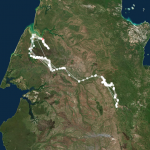dispersal
Every now and then an animal shows up where it is unexpected. Why just the other day a black bear had to be coaxed out of a tree down by the middle school, a couple of blocks form here. Even though our marshes, woodlands, and small patches of prairie house cougars, coyotes, deer, and all the smaller critters, both bears and wolves are not at present endemic to the Twin Cities suburbs.
When the unexpected appearance of a wild animal happens, there are usually one three factors at play. A migratory animal (typically a bird) is a bit off course, or lands where it normally flies over. The…
A ring-tailed lemur (Lemur catta), photographed at the Bronx Zoo.
Who doesn't love lemurs? The strepsirrhine primates, or wet-nosed cousins of ours, are favorite documentary subjects and extremely popular zoo attractions. And, in one of those bits of zoological trivia that everyone knows, lemurs only live on the island of Madagascar off Africa's southeastern coast. The question is how they got there.
Documenting the paths of animals during geological history is not an easy task. In the days before scientists understood plate tectonics, land bridges, now sunk beneath the ocean, were often…
Back when I started this, I remarked that one of the reasons I hadn't read the Origin was that I couldn't imagine it being essential to a grasp of contemporary science. Regarding evolution, I think you could still make a case for this. But in other ways, that statement shows that you really shouldn't opine on topics you know nothing about.
Specifically, I'm talking about ecology (by which, just to be clear, I mean the study of the interactions of living things with each other and their environment, rather than 'nature' or 'environmentalism'). It's been said that all European philosophy is a…
When the Origin was published, the idea that species were not fixed entities had been in the air for some time, thanks to Lamarck, Robert Chambers, anonymous author of the best-selling Vestiges of the Natural History of Creation, and Darwin's own grandfather, Erasmus.
But unlike those men, Darwin put all the different pieces together into a coherent whole. How was that? Chapter 11 of the Origin, 'Geographical distribution', gives some hints.
First there's the nurture. In the age of long-haul flights and wildlife documentaries, it's easy to forget how difficult it was to see different…
